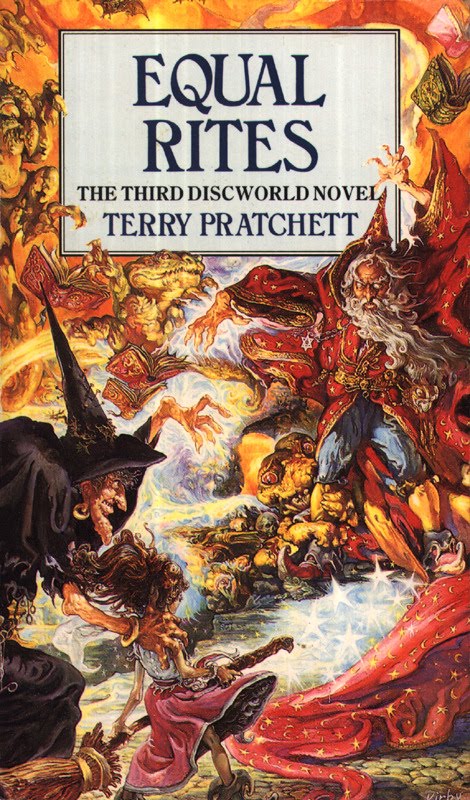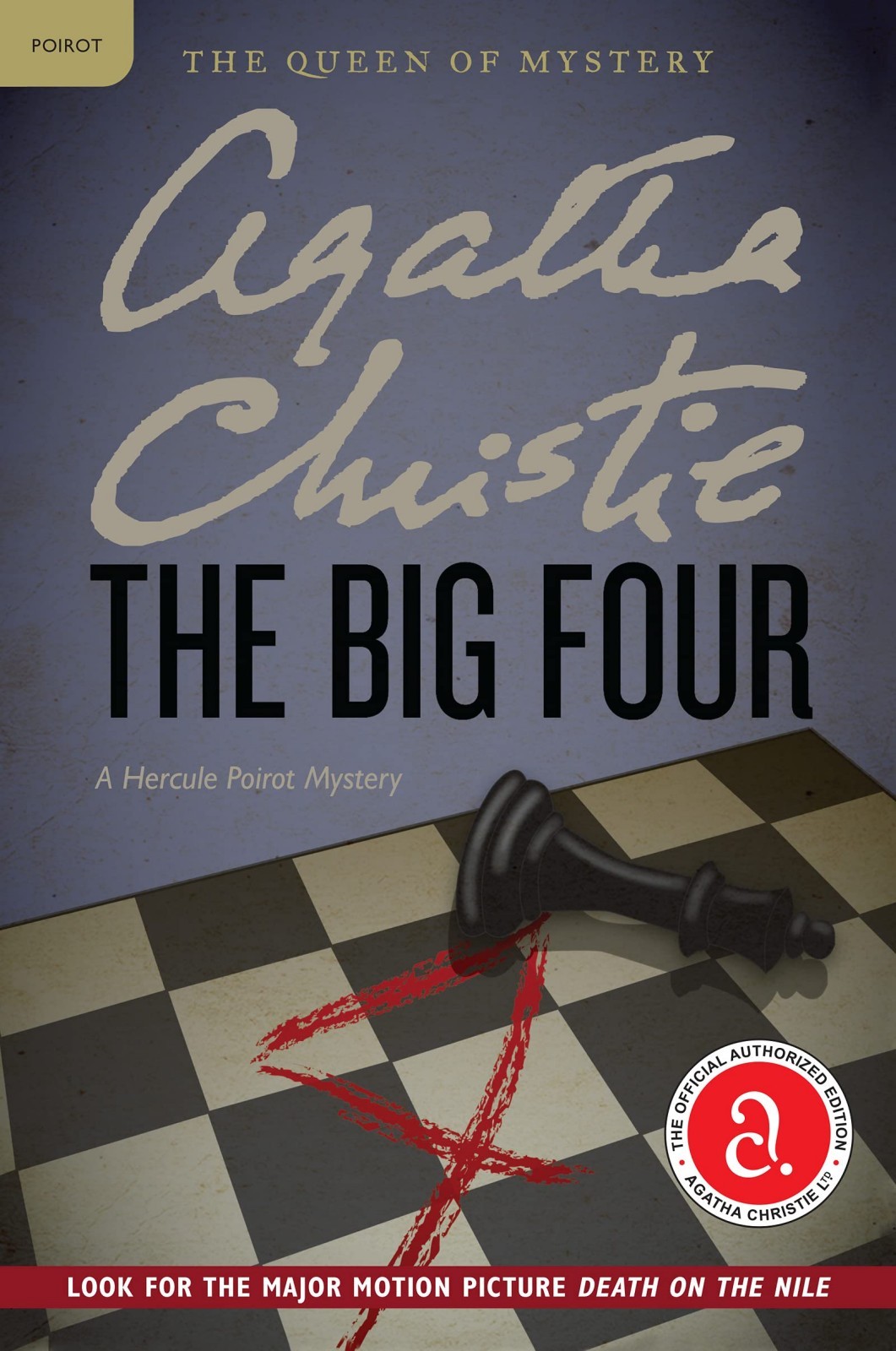Equal Rites (Discworld, #3; Witches, #1)
Title: Equal Rites (Discworld, #3; Witches, #1)

Author: Terry Pratchett
Published in: 1987
Date read: 9th October 2006
Score: 5/5
Genre: Fantasy, Comedy
Plot: (Warning, may contain spoilers):
"Equal Rites" by Terry Pratchett is the third novel in his Discworld series and the first to feature the formidable witch, Eskarina Smith, as a central character. It's a whimsical yet insightful exploration of gender roles, destiny, and the nature of magic itself.
The story begins with the death of the eighth son of an eighth son, a traditional requirement for becoming a wizard on the Discworld. On the night of his death, the wizard Drum Billet attempts to pass on his staff and magical power to this nascent wizard, who he assumes will be born a boy in the nearby village. However, due to a slight miscalculation and the fact that the eighth son's father only has daughters, the magic instead falls upon Eskarina Smith, an infant girl.
Eskarina, or "Esk" for short, grows up exhibiting undeniable magical talent, which manifests in unpredictable and often disruptive ways. This causes a considerable dilemma, as the Discworld's magical traditions strictly dictate that only men can be wizards, while women are relegated to the path of witchcraft. The two forms of magic are seen as fundamentally different and mutually exclusive.
When Esk is eight years old, Granny Weatherwax, the stern, pragmatic, and immensely powerful witch of Bad Ass, arrives to assess the situation. Recognizing the unprecedented nature of Esk's gift and the potential danger it poses if left untrained, Granny reluctantly agrees to take Esk to the Unseen University in Ankh-Morpork, the Discworld's premier (and exclusively male) institution for wizards.
The bulk of the novel follows Esk's attempts to gain admittance and receive proper training at the Unseen University. She faces a rigid, sexist, and often absurd magical bureaucracy, personified by the stuffy wizards who refuse to believe a girl can possess wizardly magic. While Granny Weatherwax provides her own unique brand of "moral support" and guidance, Esk must navigate the challenges of fitting into a system that was never designed for her.
Esk's presence at the University causes increasing magical disruption, and she eventually uncovers a larger, more existential threat involving the fabric of reality itself, linked to the "sorcery" of magic that exists beyond traditional understanding. She must prove that gender has no bearing on a wizard's potential, ultimately breaking down old traditions and proving that "equal rites" apply to magic too. The novel explores themes of gender equality, breaking down barriers, the nature of power, and finding one's true path regardless of societal expectations.
Comments:
Brilliant introduction to the Witches of Discworld. I was told by an English teacher and fellow fan of Discworld that she always advises people to start reading these books here to gain the love of the series then to go back and read The Colour of Magic and The Light Fantastic afterwards. Terry was an amazing author, but books 1 and 2 were not as good as the rest, he got much better very quickly. If you start with 1 and 2 and find it difficult, don't give up! I was lucky that I started with a random copy of Interesting Times (book 17) and although I knew nothing of the lore or characters, it made sense and got me hooked.
Books that we've read by Terry Pratchett (39):
The Colour of Magic (Discworld, #1; Rincewind, #1) (1983), The Light Fantastic (Discworld, #2; Rincewind, #2) (1986), Equal Rites (Discworld, #3; Witches, #1) (1987), Mort (Discworld, #4; Death, #1) (1987), Sourcery (Discworld, #5; Rincewind, #3) (1988), Wyrd Sisters (Discworld, #6; Witches, #2) (1988), Guards! Guards! (Discworld, #8; City Watch, #1) (1989), Pyramids (Discworld, #7) (1989), Eric (Discworld, #9; Rincewind, #4) (1990), Moving Pictures (Discworld, #10; Industrial Revolution, #1) (1990), Witches Abroad (Discworld, #12; Witches, #3) (1991), Reaper Man (Discworld, #11; Death, #2) (1991), Small Gods (Discworld, #13) (1992), Lords and Ladies (Discworld, #14; Witches, #4) (1992), Men at Arms (Discworld, #15; City Watch, #2) (1993), Soul Music (Discworld, #16; Death, #3) (1994), Interesting Times (Discworld, #17; Rincewind, #5) (1994), Maskerade (Discworld, #18; Witches, #5) (1995), Feet of Clay (Discworld, #19; City Watch, #3) (1996), Hogfather (Discworld, #20; Death, #4) (1996), Jingo (Discworld, #21; City Watch, #4) (1997), Carpe Jugulum (Discworld, #23; Witches, #6) (1998), The Last Continent (Discworld, #22; Rincewind, #6) (1998), The Fifth Elephant (Discworld, #24; City Watch, #5) (1999), The Truth (Discworld, #25) (2000), The Last Hero (Discworld, #27; Rincewind, #7) (2001), Thief of Time (Discworld, #26; Death, #5) (2001), Night Watch (Discworld, #29; City Watch, #6) (2002), The Wee Free Men (Discworld, #30; Tiffany Aching, #1) (2003), Monstrous Regiment (Discworld, #31; Industrial Revolution, #3) (2003), A Hat Full of Sky (Discworld, #32; Tiffany Aching, #2) (2004), Going Postal (Discworld, #33; Moist von Lipwig, #1) (2004), Thud! (Discworld, #34; City Watch, #7) (2005), Wintersmith (Discworld, #35; Tiffany Aching, #3) (2006), Making Money (Discworld, #36; Moist Von Lipwig, #2) (2007), Unseen Academicals (Discworld, #37; Rincewind, #8) (2009), I Shall Wear Midnight (Discworld, #38; Tiffany Aching, #4) (2010), Snuff (Discworld, #39; City Watch, #8) (2011), Raising Steam (Discworld, #40; Moist von Lipwig, #3) (2013)
This page was updated on: 18th July 2025

